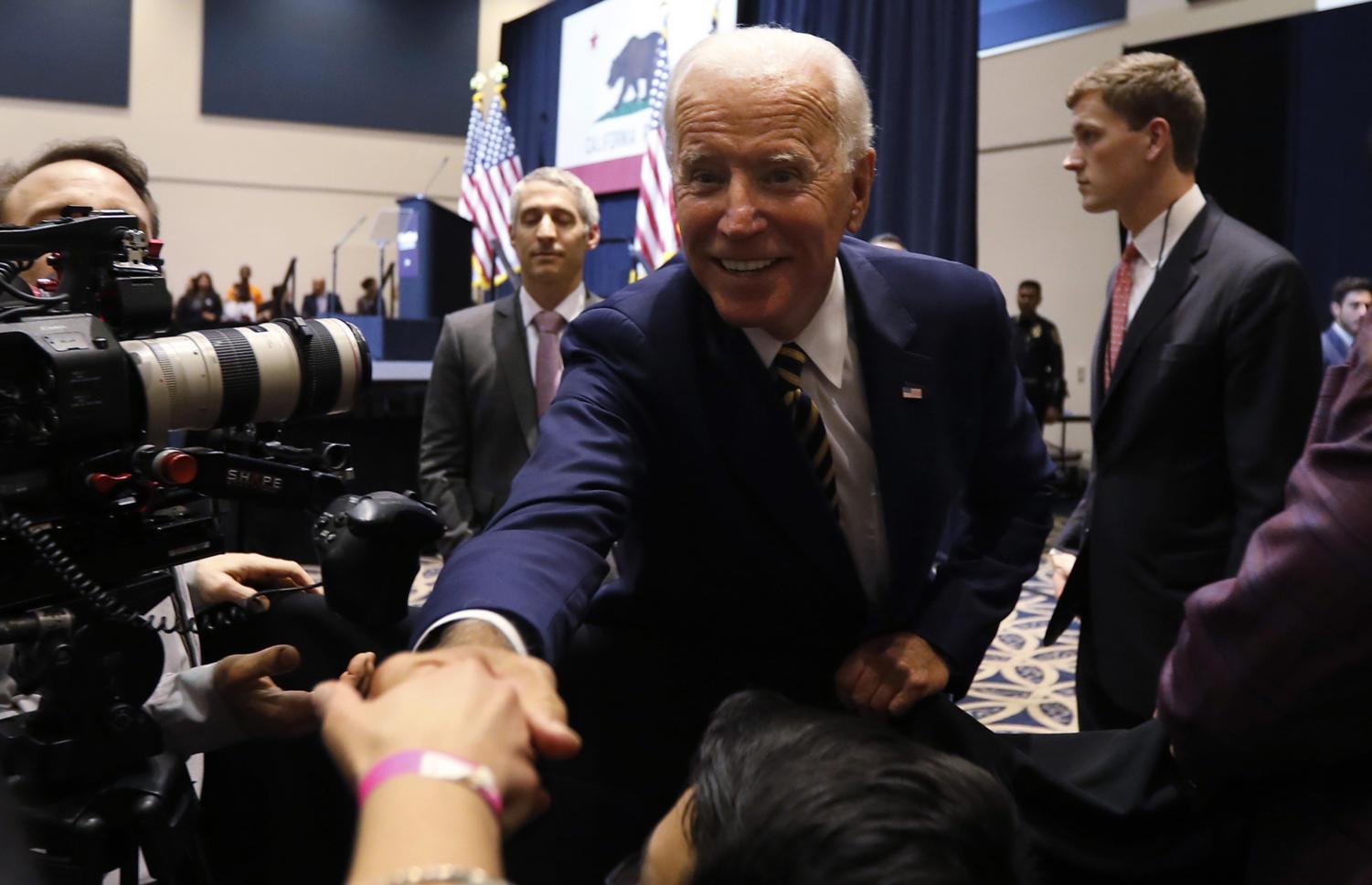If Democrats are looking for fresh, new faces, why are these septuagenarian white guys so popular?


Former Vice President Joe Biden shakes hands with supporters after speaking at a political rally at Cal State Fullerton on October 4, 2018, in Fullerton, Calif.
After congressional elections in which Democrats in record numbers chose to elevate women, minority and gay candidates, casting ballots for diversity and youth in district after district, the list of presidential hopefuls most exciting to Democratic voters is a bit curious.
At the top, several polls indicate, is a septuagenarian white guy synonymous with the party establishment _ Joe Biden. Next is another 70-plus white man whose trouble connecting with black voters hurt his last presidential run _ Bernie Sanders. And just behind them in the early polls is yet another white elected official, albeit a younger one, Beto O’Rourke.
Even if early voter surveys are a limited indicator of where the race is going, measuring the familiarity of candidate names as much as anything, the sustained popularity of these straight white men is hard to overlook.
The conventional wisdom holds that the Democratic Party is looking for fresher, more diverse faces. Yet being an older white man isn’t shaping up to be a deal breaker.
Biden and Sanders remain top candidates even in a party that has made confronting white privilege a central plank. That shouldn’t be a surprise, political scientists say: The reality that candidates are products of white privilege themselves will likely matter less to party activists than how effectively they can disavow it and crusade for racial justice, and describe themselves to voters as best positioned to topple President Trump.
“A septuagenarian white guy may not be the first preference of Democratic voters, but if that is who emerges as the best choice to beat President Trump, they are going to vote for him,” said Lynn Vavreck, a UCLA political scientist and co-author of the book “Identity Crisis: The 2016 Presidential Election and the Battle for the Meaning of America.”
The anxiety among some Democratic officials that the new face of the party could end up being another old, white male is misplaced, she said.
“The people who are out there saying the nominee should be a person of color, or they should be this or that, are offering a quick and dirty way of thinking about the race, but it is not really that productive,” Vavreck said.
The color of a candidate’s skin, their gender and their age play only a peripheral role in their potential to reignite the coalitions of racially and ethnically diverse voters who helped propel Barack Obama to victory and, more recently, Democrats to flip 40 seats in Congress, she said.
Even so, the headwinds are real in 2020 for old, white candidates in a young, increasingly nonwhite party. When The Wall Street Journal recently surveyed 76 Democratic Party county chairs in Iowa, nearly two-thirds said they were looking for a candidate who wouldn’t be in their 70s on caucus day and who hadn’t run for president before.
The activists were less concerned about whether a candidate was a man or a woman. Those results did not bode well for Biden, Sanders or the one well-known Democrat who has already formed an exploratory committee for the race, Massachusetts Sen. Elizabeth Warren, whose 70th birthday will be this June.
Another possible indicator of sentiment among activists comes from a straw poll released this week of 35,000 readers of the Daily Kos blog, who tend to be liberal voters intently focused on finding a candidate who can beat Trump. Though not a random survey, the poll gives some indication of the degree of support among the type of activists who can influence primaries.
By contrast with the more general polls, Warren won decisively among the Daily Kos readers, with 22 percent, followed by O’Rourke at 15 percent and Biden tied with Sen. Kamala Harris at 14 percent.
The belief that Democratic voters will eschew white, male candidates, whether accurate or not, has influenced media coverage of the candidates. As CNN rolled out its “power rankings” of possible candidates last month, for example, political-data expert Harry Enten punctuated an otherwise flattering assessment of Ohio Sen. Sherrod Brown by noting his race and gender could be a deal killer.
“Another white male,” he said, noting the preference for diversity Democrats had just expressed through the midterm election. “I am very suspect of that this year. … I am not sure it is time to nominate a white man.”
Such talk is a little jolting to Cornell Belcher, a strategist who was on Obama’s polling team and has long argued that the Democrats need to do more to focus on the concerns of black voters.
For much of his life, one of the biggest liabilities a presidential candidate could have was not being white, Belcher says. He bristles at the idea that white men like Sanders and Biden are at any kind of disadvantage, but says the playing field is finally level.
“I don’t think there is a racial qualifier or disqualifier,” said Belcher, who is not affiliated with any of the potential candidates. “You have to be someone who can speak truth to power around issues of inclusion and diversity,” he added. “The candidate who can do that with a forward-focused vision for the future of this country that is about bringing people together will do well in this primary whether he or she is black or white.”
Biden could be particularly well positioned for that role, he said. “Being the guy who most voters of color and even younger voters see as the guy who unquestionably had Barack Obama’s back more than anyone else doesn’t hurt you in this primary,” he said.
In a recent Suffolk University/USA Today poll, more Democrats said they were excited about Biden _ 53 percent _ than any other politician mulling a presidential run.
Former Texas Congressman O’Rourke’s ability to draw large numbers of millennials and Latinos to the polls by passionately confronting Trump’s immigration policies, sermonizing about unity and hope at packed town halls, and harnessing social media to mobilize activists makes the 46-year-old Irish Catholic an attractive champion for the party’s diversity push, Belcher noted.
“A white candidate might get extra kudos if he or she can speak authentically to these issues of discrimination,” Belcher said. “It is almost like a counter-narrative. When Beto started talking about speaking truth to power about discrimination and profiling, he caught the attention of a lot of people.”
Sanders proved through his candidacy in 2016 that even a candidate of retirement age can catch fire with young voters and draw legions of new people into the process. The Vermont senator emerged as the second-most-popular choice in the Suffolk poll, which was released Dec. 26. He maintained an impressive 74 percent favorability rating among Democrats in a Quinnipiac University poll published a week earlier, edged out only by Biden.
Most analysts don’t expect Biden, Sanders and O’Rourke to all still be at the top of the polls a year from now. Their current strong numbers are skewed by the fact that voters are much more likely to know who they are. Other candidates will have ample opportunity to boost their profiles.
At this point in the last presidential cycle, former Florida Gov. Jeb Bush was polling as the runaway favorite to win the GOP nomination, and Trump barely even registered as a factor in the race. Those polls gave no indication that Sanders would crush Hillary Clinton in New Hampshire and several other states.
The race is about to be joined by several candidates who are not yet household names in Iowa and New Hampshire but will be soon. Among them are likely to be Harris and New Jersey Sen. Cory Booker, prominent black lawmakers who can speak to issues of discrimination and intolerance from personal experience and family history, which their white male counterparts can’t.
The increasingly diverse party’s desire to see nonwhites at the helm, and a primary calendar in which African-American voters will have considerable influence in choosing the nominee, may play to their advantage.
“It will be about more than just, ‘this person is black,'” said Andra Gillespie, a scholar in African-American politics at Emory University.
“People have the impression that’s how it is because they saw how many voters flocked to Barack Obama,” she said. “But blacks weren’t on that bandwagon initially. It wasn’t until Obama proved himself a viable candidate.”
Even so, Gillespie said, it would not be a good look for the party if the circle of front-runners remains exclusively white men when Iowans caucus a year from now.
“The Democratic Party would have some serious soul-searching to do if three white men are still at the top next January,” she said. “That would be a cause for concern if no serious candidates of color emerge.”
Recent Posts
Therese Pitman: Giving back to Pitt’s student-athletes with equality
Pitman is Pitt’s Director of Student Athlete Development where she helps student-athletes navigate their career…
Pitt speech and debate team heads to nationals
The William Pitt Debating Union, Pitt’s speech and debate team, sends students to both in-person…
Visuals: A Year in Review
The visuals desk had an interesting year. In the midst of the 2024 Presidential Election,…
De-stress events across campus offer students a break from studying
During finals week, departments across campus are offering wellness events to help students manage stress…
Pitt students share their summer plans
After a long and strenuous academic year, many students are excited to take a break.…
Column | Collaboration and connection make us better — yes, even in journalism
Today is the last day I will ever do this, and despite the amount of…

